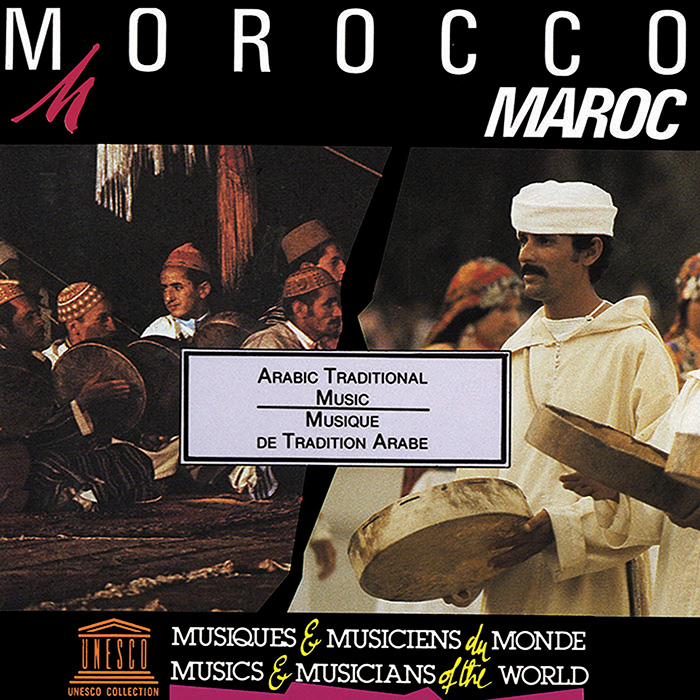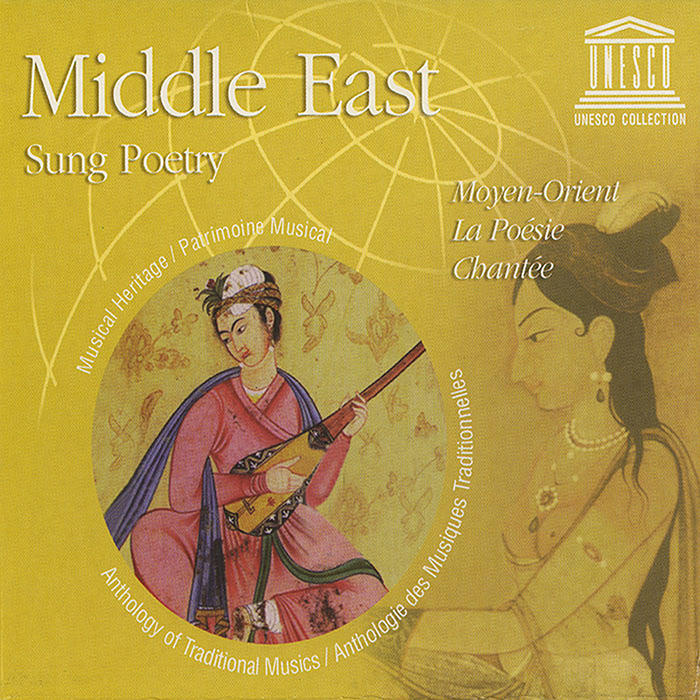-
UNESCO Collection Week 21: Arabic Music Tradition of Morocco and Sung Poetry of the Middle East
This week’s releases feature Arabic and Middle Eastern music traditions with Morocco: Arabic Traditional Music and Middle East: Sung Poetry.
GUEST BLOG
by Jeanne Gillespie
Songs from around the world have always fascinated me. As a young girl, I was drawn to songs, especially for those we sang in other languages. I loved “Alouette,” “Kookabura,” “Sakura,” and “Cielito Lindo,” but “Wimoweh” was my all-time favorite. I loved how differently the songs sounded and how they helped me create a sound image to link with a spot on my treasured globe.
Many years later, while I was studying for a political science college course on Russian and German political structures, the Rolling Stones’ “Sympathy for the Devil” came on the radio. I had a significant “aha” moment—the kind all teachers wish for their students—when Mick Jagger blurted out, “I rode a tank / held a general’s rank / when the blitzkrieg raged / and the bodies stank.” I realized at that moment that this song was a container that had captured and shared a moment of history. It was telling a profound story that engaged me in a way that the textbook had not. I went back to my notes to learn more about the blitzkrieg and that moment in time.
Listening to these two recordings—Morocco: Arabic Traditional Music and Middle East: Sung Poetry—reminded me of a very pleasant moment from my travels several years ago. I was on a research trip to Seville, Spain, and I had the opportunity to escape for a short jaunt to Tangier, Morocco. While touring the Medina, I got to hear a concert by Moroccan musicians at a local restaurant. As I am interested in Arabic influences in Andalusian Spain, the music was especially delightful.
The selections from Morocco: Arabic Traditional Music reminded me of the musicians in Tangier. As the liner notes explain, the compositions by acclaimed composer Abdeslam Cherkoui reflect a fusion of classical and contemporary music in Arabic. Cherkoui specializes in the oud, an 11- or 13-stringed instrument similar to the lute. In the 1970s, he taught oud and violin at conservatories in Fez and other cities. Cherkoui is a cultural icon and has been featured on Moroccan television.The fourth track, “Ya Hbibi malek Sahi” (“Lover, why are you forgetful?”), is of a musical genre called ‘aita (“call”) for its long sustaining notes and falling melodies, performed in the northern and central areas of Morocco. A plaintive wail of, “Oh lover, why are you so neglectful, leaving my mind stunned?” elicits a variety of responses with the reasons for the lover’s distress: “Your nearness to me brings recrimination. Your remoteness from me brings torture / Between the two my heart melts and you have added grief to love.” This genre, which the blog Moroccan Tape Stash likens to the “old time music” of the rural United States, traditionally culminates in a performance by female dancers.1
Track 3, “Afak gul li ghir iyyeh” (“Please just say yes”) is another example of ‘aita but with a more modern sensibility. The lover agrees to meet the beloved on each day of the week in a different place. The refrain “Please just say yes, ask friends and lovers” punctuates each verse. “You agreed to meet me on Thursday / I waited for you in a Mercedes / When are you coming with me, Companion, by the banks of the streams?”
The collection Middle East: Sung Poetry also offers intriguing moments in time and history. The first track on this album is a 16th century nefes, a hymn performed by the Bektashi religious order, composed by Turkish poet Pir Sultan Abdal while he was awaiting execution.2 Pir Sultan was a practitioner of Alevism, a Sufi-Shia spiritual tradition that celebrates humanistic practices including music, dance, and poetry in which both women and men participate.AudioThe melancholic, melismatic “Ataba Hawawié” (track 4) incorporates a nayel, a popular verse form from the Syrian-Iraqi desert that bemoans a lover who has gone missing: “The dear one who was with me in my sleep / Vanished when I awoke like the fancy of a dream.” This song is a type of improvised poetic vocal genre, composed in the form of four-line stanzas called ataba, which has gained in popularity in Lebanon, Syria, Jordan, and Iraq. Further investigation revealed that the ataba has its origins in the Bedouin oral tradition and is also popular at Palestinian weddings and festivals. I am especially captivated by the sensuality expressed in the lyrics and intrigued by the mouleya (a song that describes a secret language between separated lovers) as a cryptic genre that allows lovers to communicate without others understanding the conversation.
Songs capture moments that can connect or inspire us to seek more information. With access to archival recordings like the UNESCO Collection of Traditional Music, plus the amazing range of knowledge that the Internet provides, we can discover so many more interesting tidbits and unknown aspects of the people, places, and art forms that intrigue us.
Dr. Jeanne Gillespie is a faculty member in the College of Arts & Sciences at the University of Southern Mississippi and has taught courses at all levels of Spanish language and cultures, women’s and gender studies, and interdisciplinary studies.
2 Alain Daniélou, Liner Notes, Sung Poetry of the Middle East, UNESCO Collection of Traditional Music, 1989, compact disc, p. 4.
UNESCO Collection Week 21: Arabic Music Tradition of Morocco and Sung Poetry of the Middle East | Smithsonian Folkways Recordings



